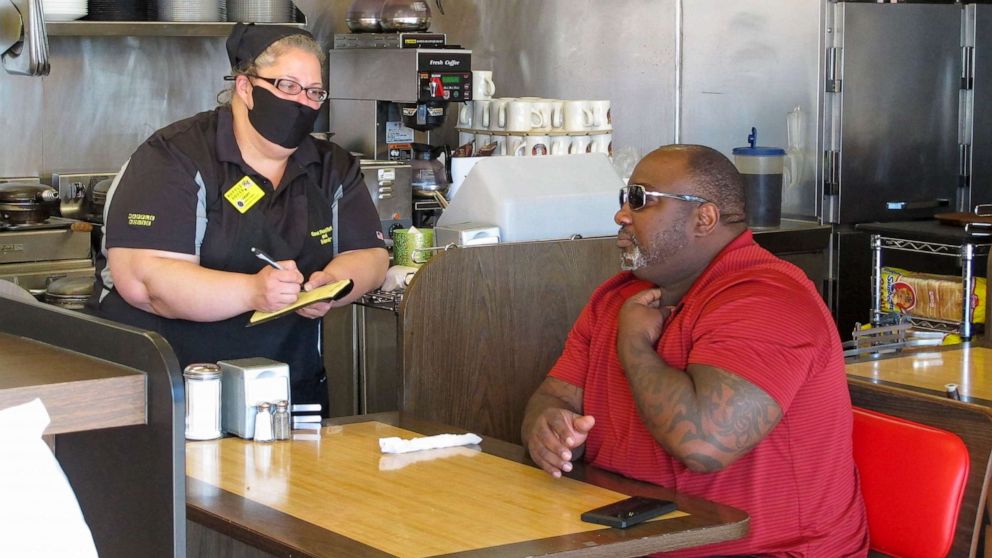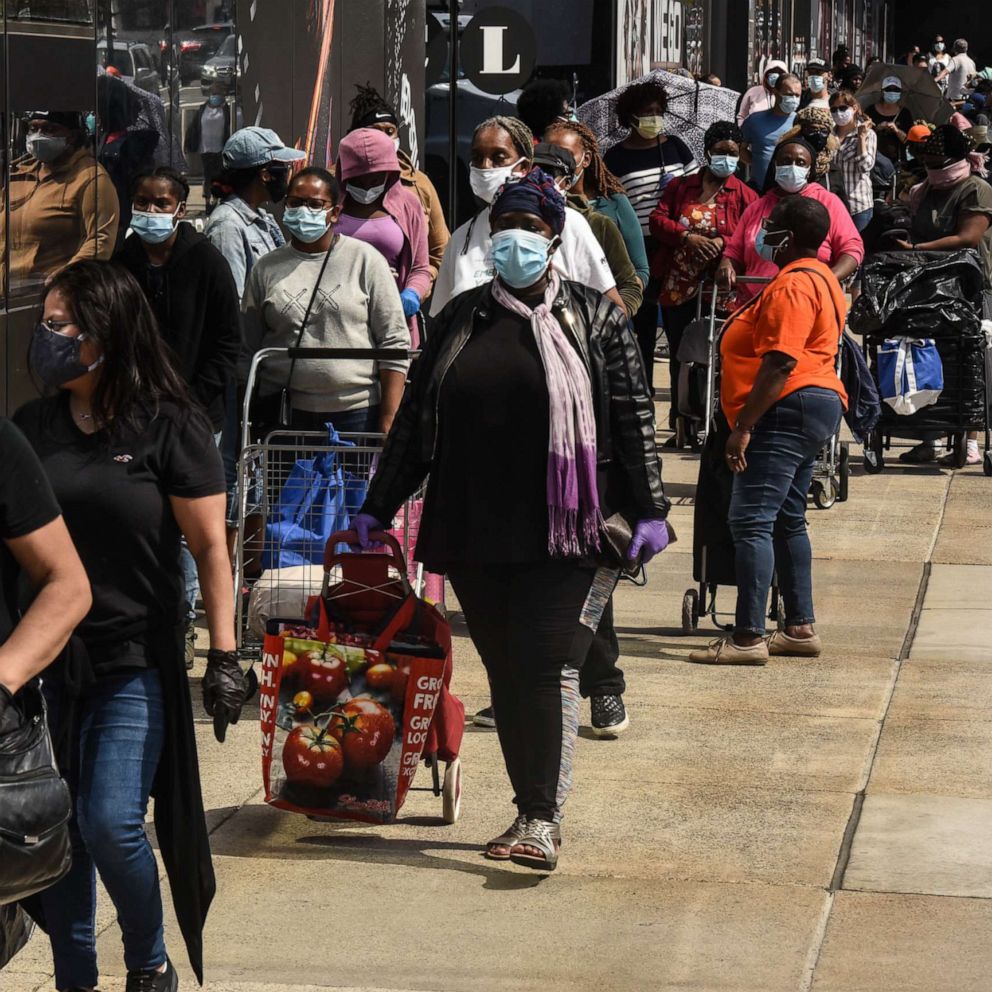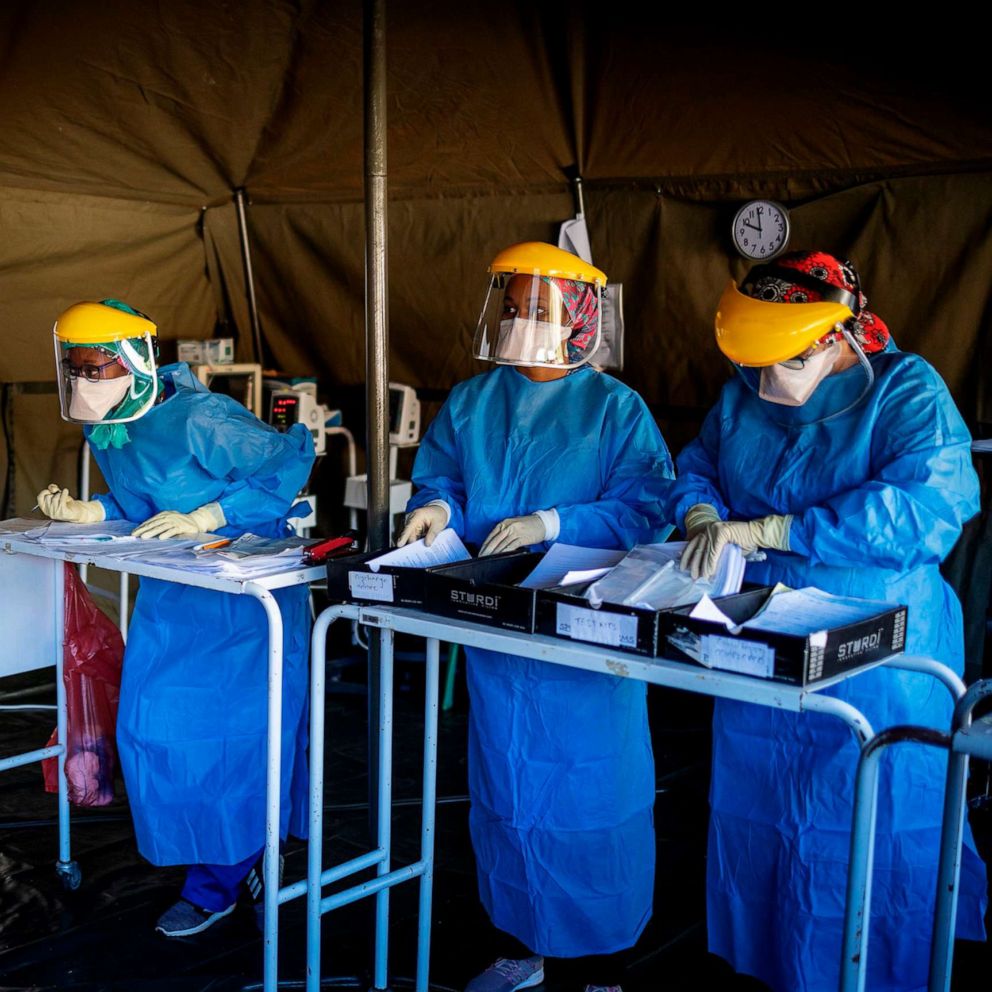Savannah requires face masks as coronavirus cases 'explode'
A pandemic of the novel coronavirus has now killed more than 509,000 people worldwide.
Over 10.4 million people across the globe have been diagnosed with COVID-19, the disease caused by the new respiratory virus, according to data compiled by the Center for Systems Science and Engineering at Johns Hopkins University. The actual numbers are believed to be much higher due to testing shortages, many unreported cases and suspicions that some governments are hiding the scope of their nations' outbreaks.
Since the first cases were detected in China in December, the United States has become the worst-affected country, with more than 2.6 million diagnosed cases and at least 127,322 deaths.
Latest:
Here's how the news is developing today. All times Eastern. Please refresh this page for updates
10:02 p.m.: Miami-Dade closing on-site dining overnight
The notorious nightlife of Miami will have to take a break after midnight.
The city announced Tuesday evening it will be pausing on-site dining at restaurants from midnight to 6 a.m. each day. The move goes into effect immediately.
"We must take this action to tamp down Miami-Dade County’s recent rise in COVID-19 cases," Miami-Dade County Mayor Carlos Gimenez said in a statement. "Too many people were crowding into restaurants late at night, turning these establishments into breeding grounds for this deadly virus."
Dade County reported 1,591 cases on June 29, the state's second-highest single-day total. The percentage of positive tests also continues to rise since early June, with 17.7% positive on June 29. The state's five highest percentages of positive tests since the pandemic began have come in the last eight days, including Monday.
9:54 p.m.: Virginia prohibits gatherings in bars
Virginia Gov. Ralph Northam said even as the state moves into phase 3 it is keeping bans on large gatherings at bars in place.
The state will move into phase 3 at midnight Wednesday, but bar seating in restaurants will remain prohibited.
"I am watching what is happening in other states -- we are taking a cautious approach as we enter Phase Three and maintaining the current restrictions on bar areas," Northam said in a statement. "In Virginia, our hospitalization rates have fallen, our percentage of positive tests continues to trend downward, and we are conducting more than 10,000 tests each day. We want these trends to continue, but if our public health metrics begin moving in the wrong direction, I will not hesitate to take action to protect the health and safety of our communities."
Virginia added 453 COVID cases on Tuesday and recorded eight deaths. The number of daily cases in the state have largely declined from 1,615 cases on May 26.
5:42 p.m.: Minor league baseball cancels season
Even as MLB inches toward returning to action, it was announced that the minor leagues will not play this season due to COVID-19.
MiLB released a statement saying that MLB "will not be providing its affiliated Minor League teams with players for the 2020 season. As a result, there will not be a Minor League Baseball season in 2020."
"These are unprecedented times for our country and our organization as this is the first time in our history that we've had a summer without Minor League baseball played," said Pat O'Connor, president and CEO of Minor League Baseball.
While MLB and its players' association came to an agreement to start camps at the end of July, there have already been a handful of players -- including Diamondbacks pitcher Mike Leake and Rockies outfielder Ian Desmond -- who have said they will not play this season.
5:27 p.m.: Texas sets another daily record
Texas is now reporting 159,986 cases statewide, with 72,744 of them considered active cases.
The state recorded a record 6,975 cases on Tuesday after the number had declined for three straight days.
The positivity rate is now 14.03% -- the second-highest one-day total for the state.
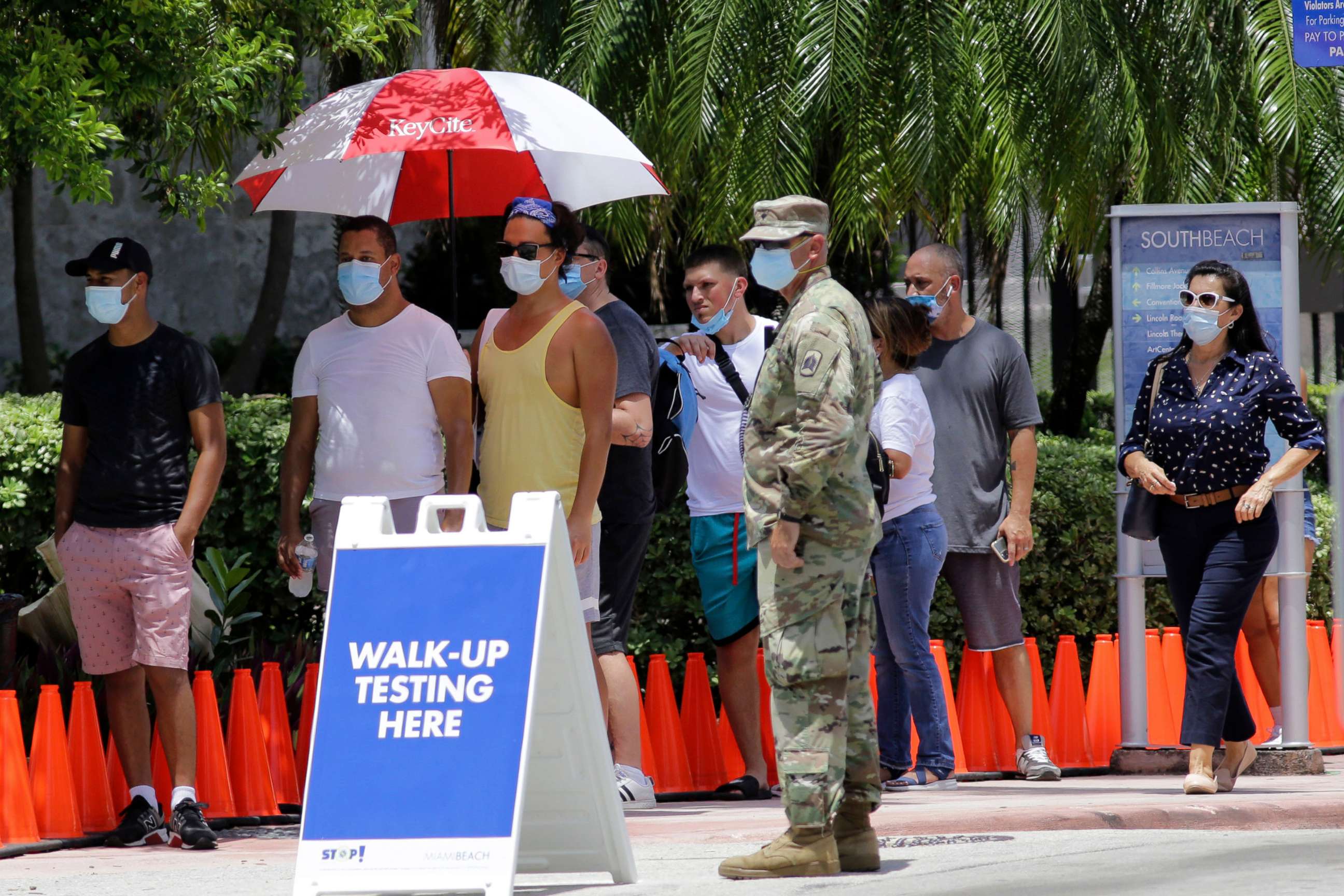
The Texas Department of State Health Services also said 6,533 people are now hospitalized, an increase from 5,900 on Monday.
Meanwhile, Harris County, which includes the state's largest city, Houston, announced it has extended its mask mandate through at least Aug. 26.
4:45 p.m.: Colorado reverses course on bar openings after neighboring states see surge
Colorado started allowing limited in-person bar service earlier in June, but now Gov. Jared Polis is reversing course and shutting down bars.
Polis said Tuesday his decision is because of surging cases in neighboring states, like Arizona and Utah, were linked to bars, nightclubs and private parties.
Colorado is seeing some increases in coronavirus infection rates, but not as severe as other states.
While bars will be closed for in-person service, Polis said they can still sell takeout alcohol.
Bars that serve food can stay open if they just function as restaurants and maintain social distancing.
4 p.m.: California governor to announce new restrictions
The percent of people testing positive for the coronavirus in California has climbed to 5.9%, Gov. Gavin Newsom said Tuesday, calling it a "point of concern."
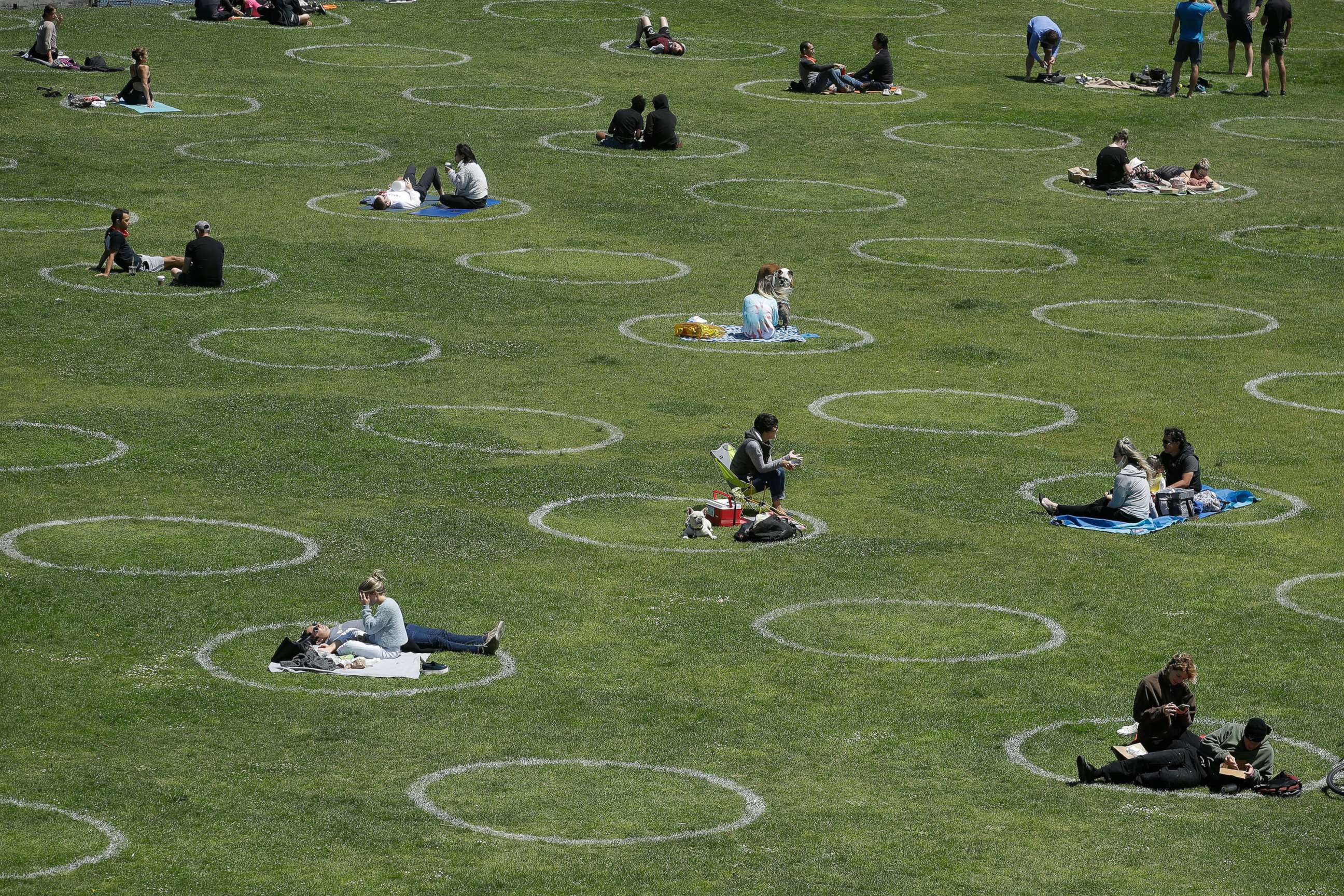
Newsom said he will make announcements on Wednesday on his efforts to "tighten things up" with new restrictions in the Golden State.
He said his announcement will include concerns around Fourth of July gatherings.
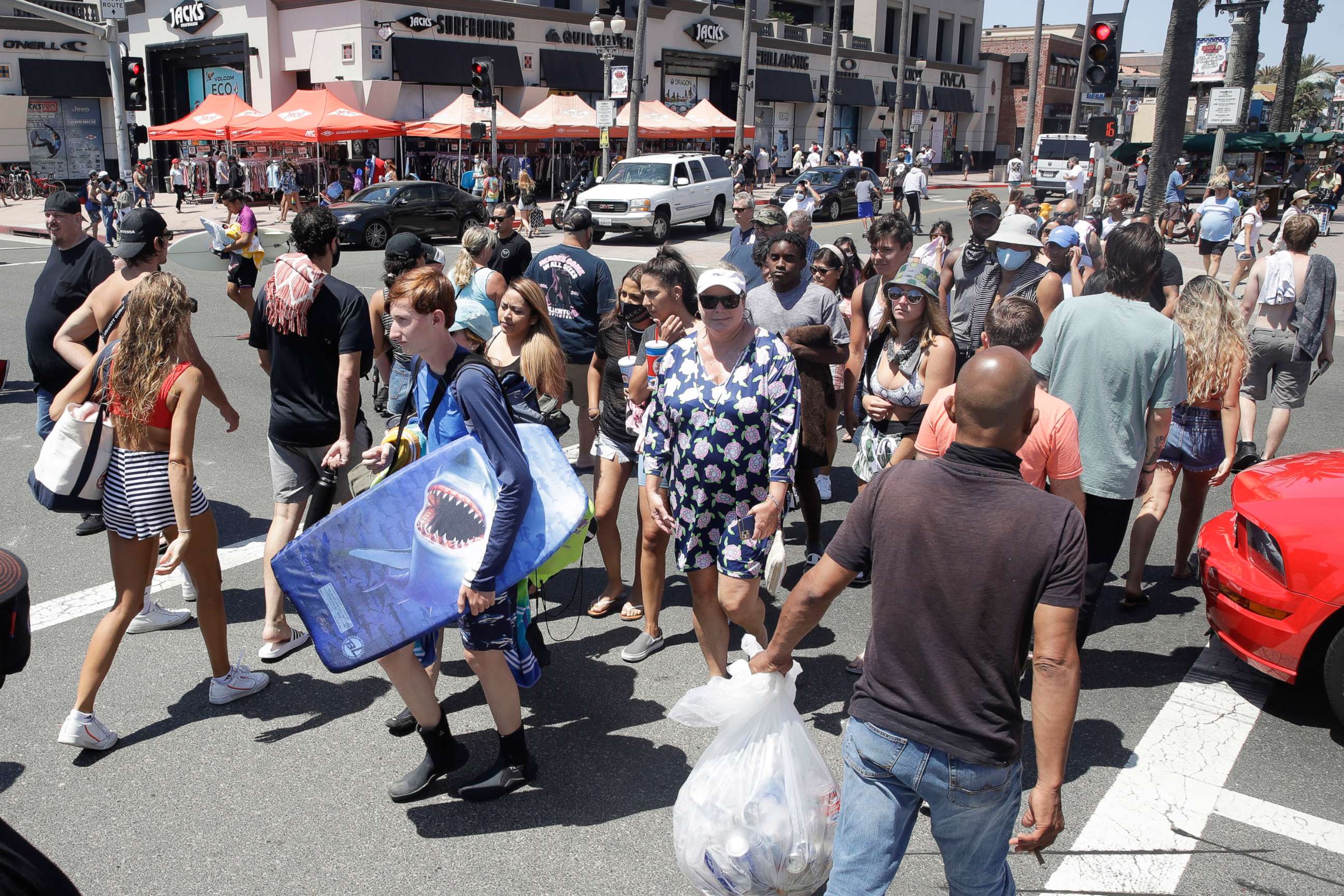
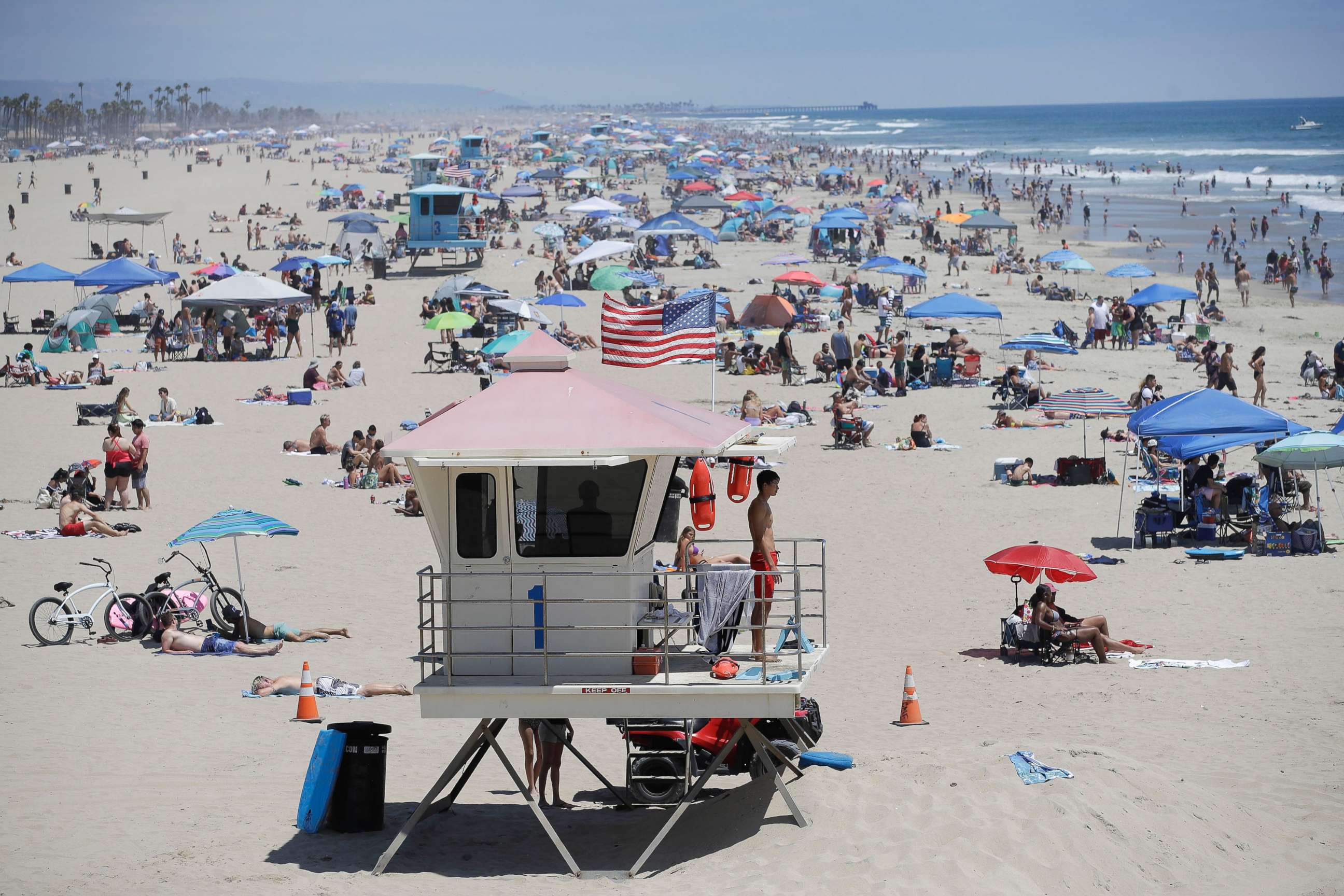
On Sunday, as cases climbed, Newsom ordered bars in several counties to close, including in Los Angeles County.
2:30 p.m.: Anyone arriving in Massachusetts from outside Northeast must self-quarantine, governor says
Anyone arriving in Massachusetts -- including residents -- from outside the Northeast must self-quarantine for two weeks, effective Wednesday, Gov. Charlie Baker said Tuesday.
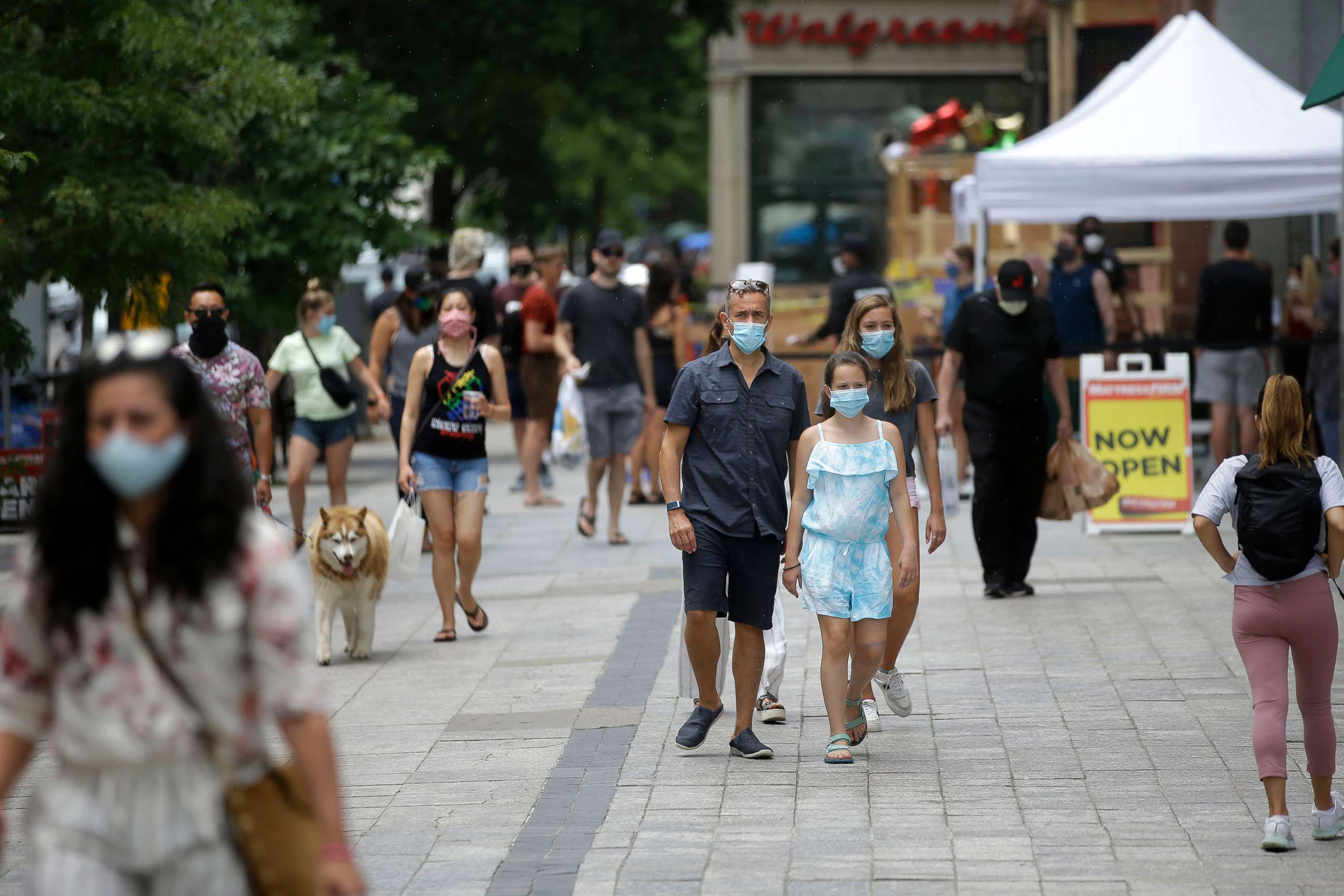
"We want to ensure out-of-state travelers take appropriate precautions," Baker tweeted.
Those traveling from Rhode Island, Connecticut, Vermont, New Hampshire, Maine, New York and New Jersey do not have to quarantine.
Meanwhile, New Jersey, New York and Connecticut are asking travelers from 16 states with high coronavirus numbers to self-quarantine when they arrive back in the tri-state.
As of Monday, the states on the list are: Alabama, Arkansas, Arizona, California, Florida, Georgia, Iowa, Idaho, Louisiana, Mississippi, North Carolina, Nevada, South Carolina, Tennessee, Texas and Utah.
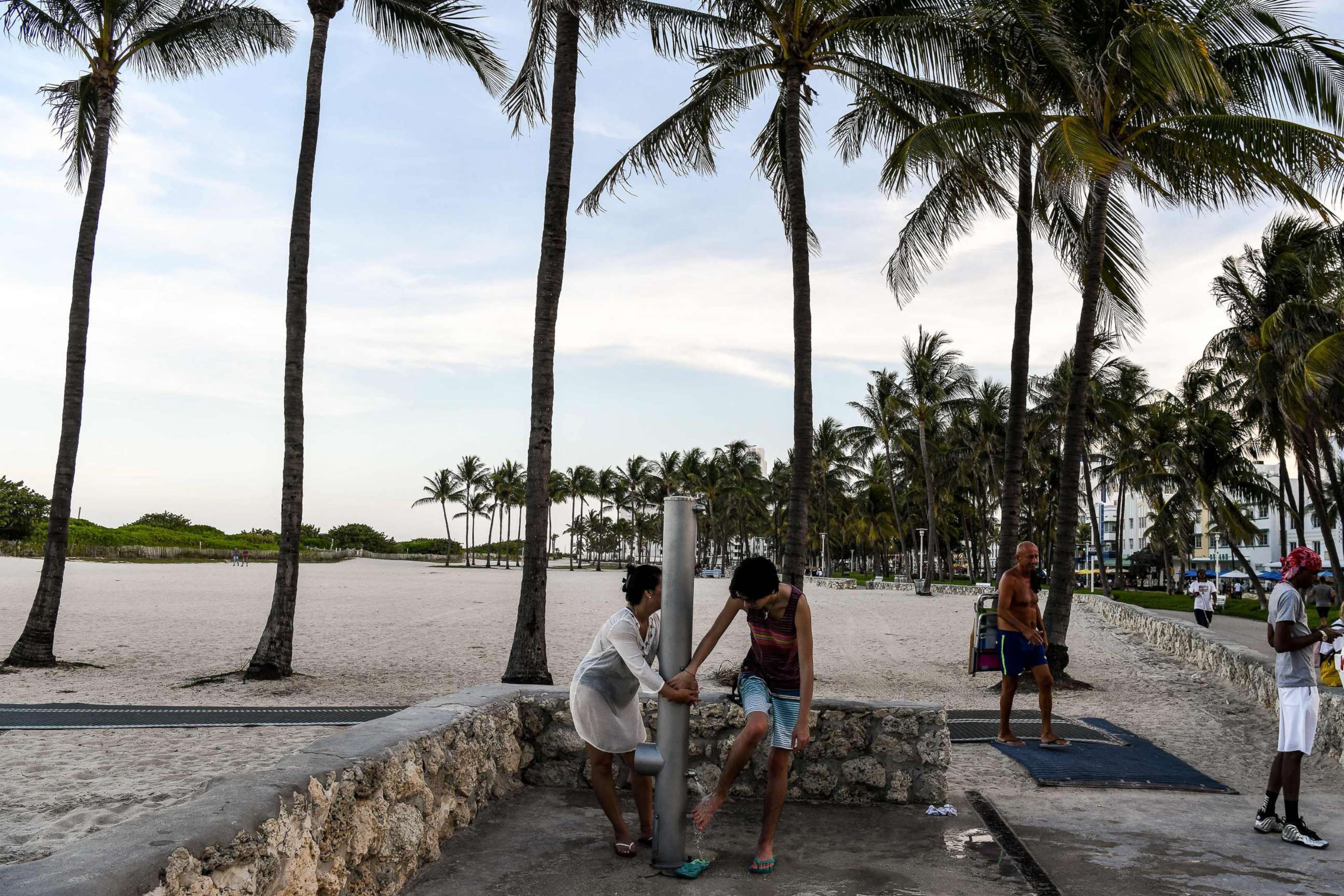
The three states are asking people to self-quarantine for two weeks, with the exception of seeking medical care and to get food and other essential items.
2:12 p.m.: One-third of those testing positive in Philadelphia are under the age of 30
On Friday, Philadelphia's outdoor sports, schools, libraries and indoor malls will reopen.
However, indoor dining, gyms and indoor gatherings of more than 25 people will remain banned, Mayor Jim Kenney said Tuesday, noting the reason was because the "targets we laid out" to reach that phase "will not be met by Friday."
Over 26,000 people in Philadelphia have been diagnosed with the coronavirus and at least 1,584 have died.
In the last few weeks, those testing positive have been younger, and they've been linked to social events and trips to the Jersey Shore, the city's health commissioner, Dr. Thomas Farely, said Tuesday, according to ABC Philadelphia station WPVI.
In the last two weeks, 34% of those testing positive are under the age of 30, WPVI reported.
Farley said those returning to Philadelphia after traveling to these high-case states should self-quarantine: Alabama, Arkansas, Arizona, California, Florida, Georgia, Iowa, Louisiana, Mississippi, Nevada, North Carolina, South Carolina, Tennessee, Texas, and Utah.
12:35 p.m.: Fauci says he wouldn't be surprised if US sees 100K cases per day
In a Senate hearing Tuesday, Dr. Anthony Fauci, the director of the National Institute for Allergy and Infectious Diseases, said, "I would not be surprised if we go up to 100,000 [cases] a day if this does not turn around."

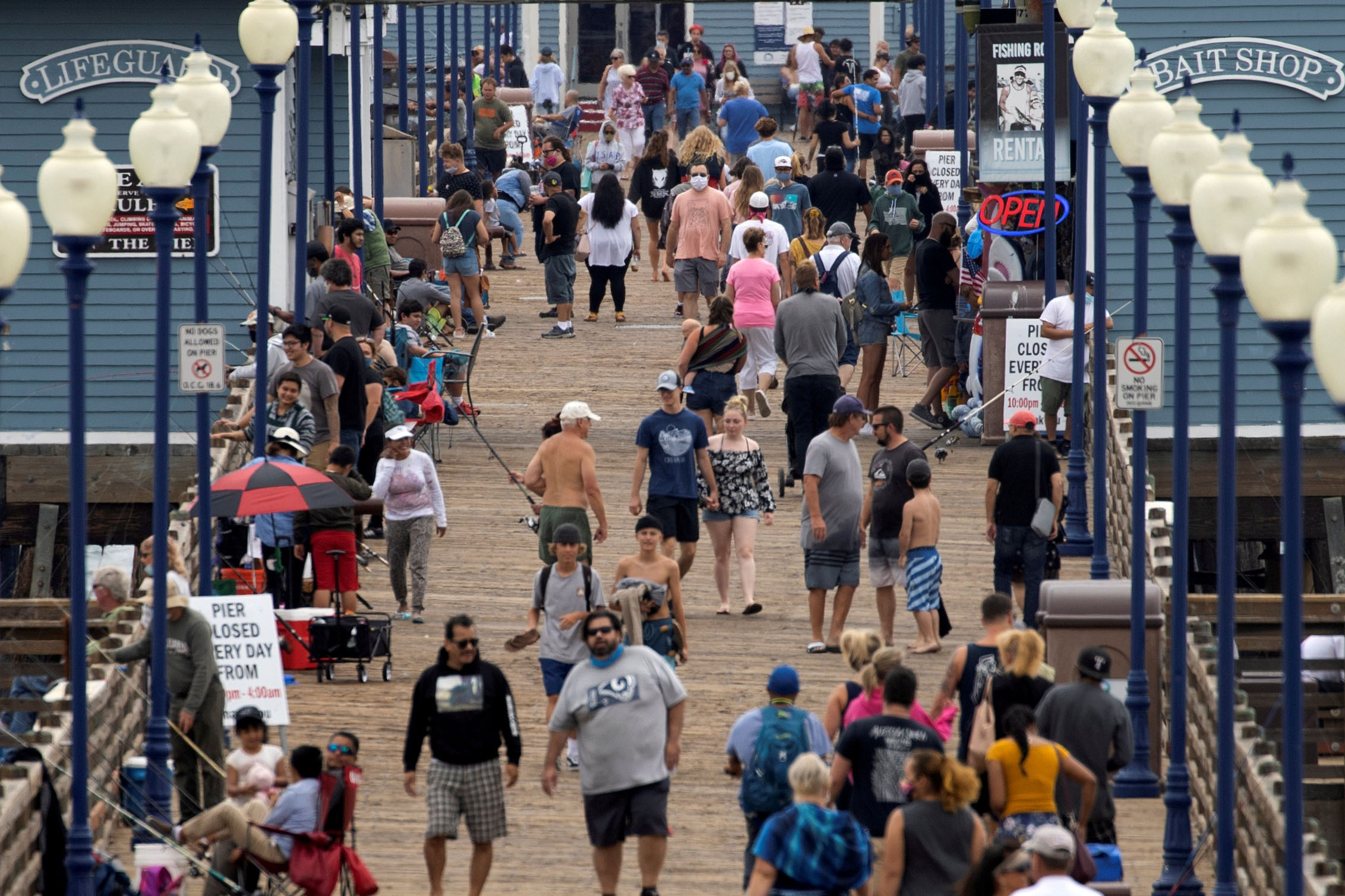
The nation is already seeing 40,000 new cases per day, Fauci said.
"We can’t just focus on the areas that are having the surge -- it puts the entire country at risk," Fauci said. "I’m very concerned because it could get very bad."
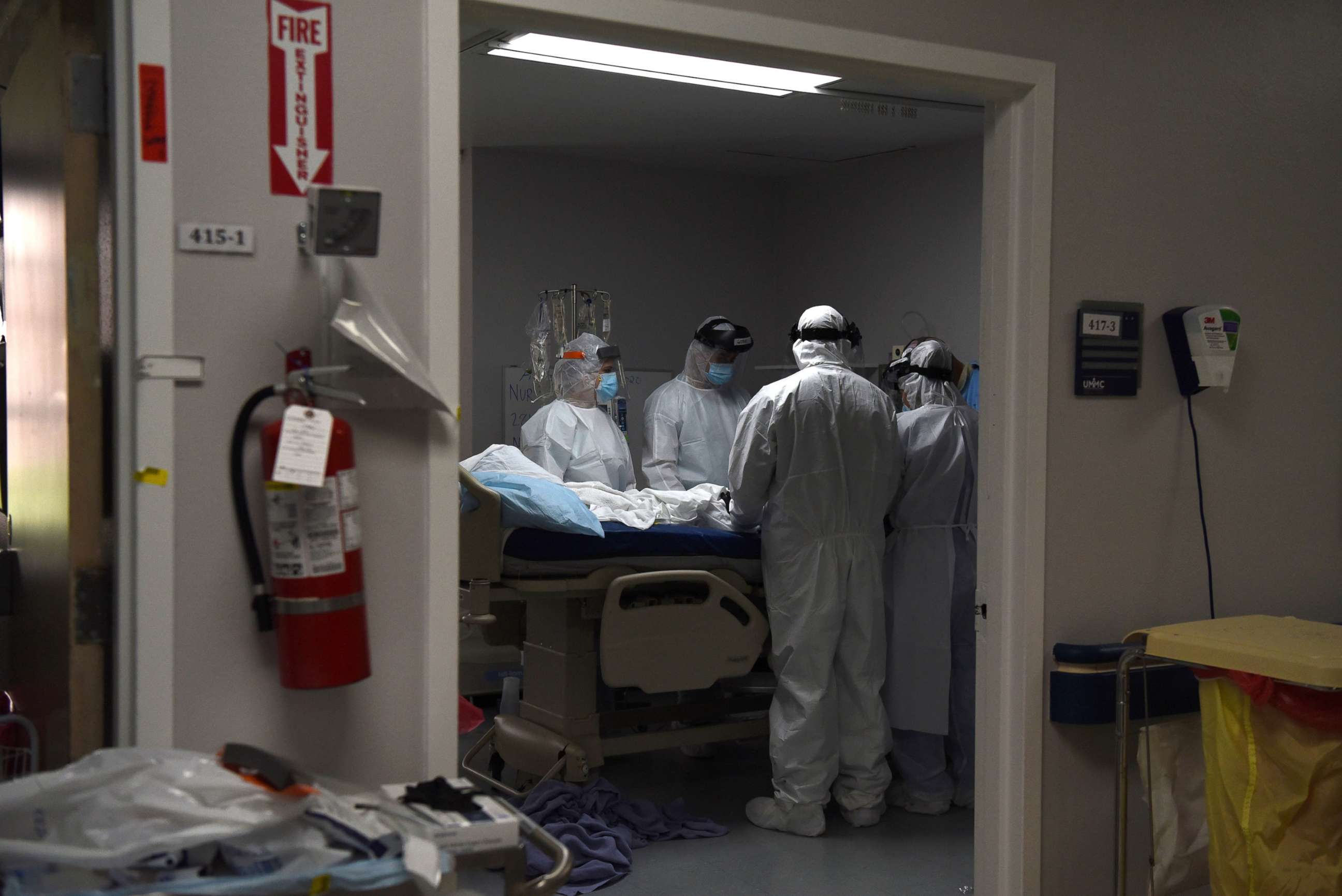
Fauci's ominous comments came as he responded to questions from Sen. Elizabeth Warren, D-Mass., who said, "We can’t keep pretending this virus is getting better."
Fauci and other top health officials were expected at the Senate hearing to warn of a "tremendous burden" that the U.S. health care system faces this fall if seasonal flu and COVID-19 are circulating together.
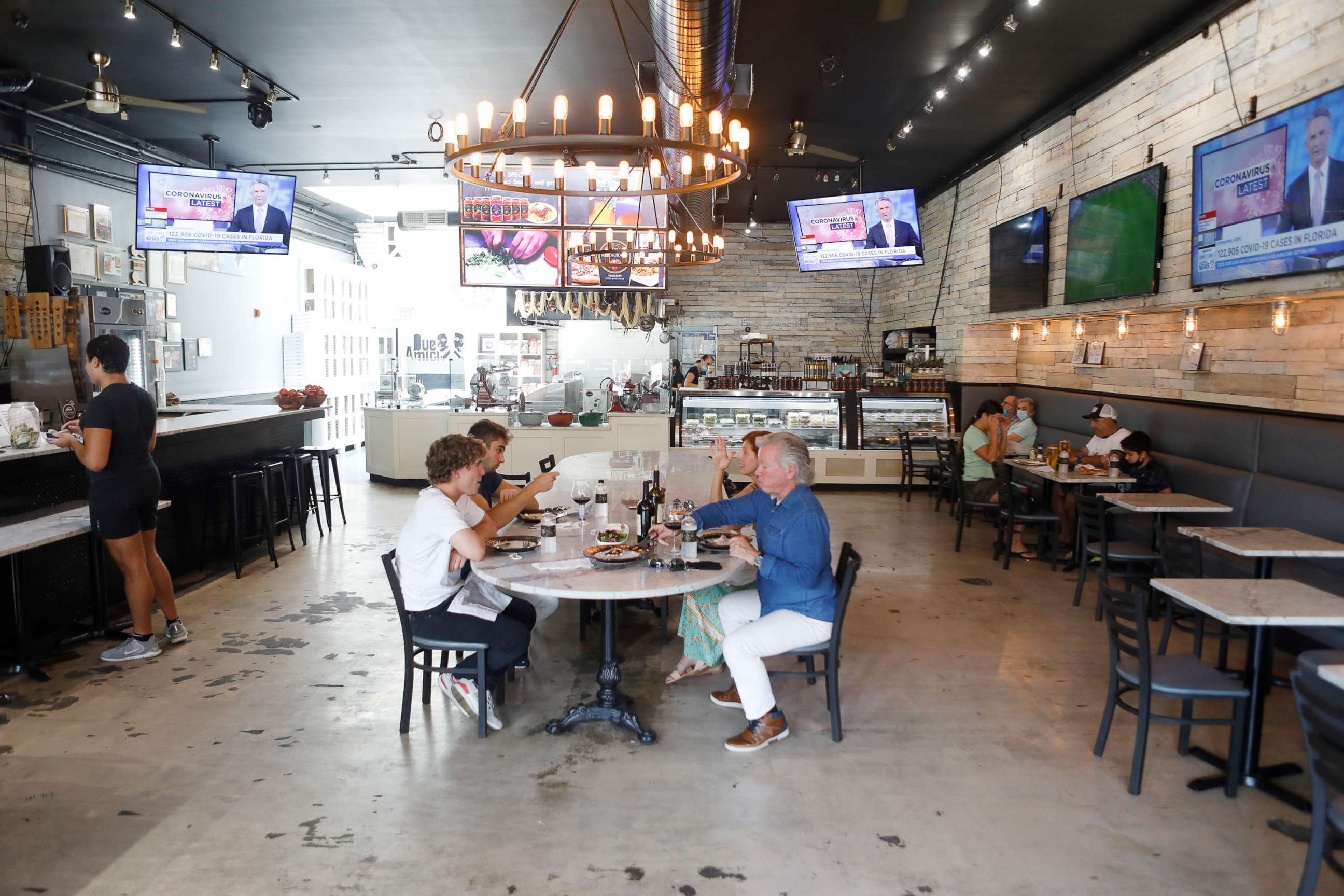
"While it remains unclear how long the pandemic will last, COVID-19 activity will likely continue for some time," the prepared statement said. "It is also unclear what impact the ongoing COVID-19 pandemic will have on health care and public health systems during the upcoming influenza season. If there is COVID-19 and flu activity at the same time, this could place a tremendous burden on the health care system related to bed occupancy, laboratory testing needs, personal protective equipment and health care worker safety."
Still, the officials are expected to stick to their suggestion that the decision to open schools be left to each community.
12:10 p.m.: Savannah to require face masks as cases 'explode'
As coronavirus cases "explode" in the Savannah, Georgia, area Mayor Van Johnson said Tuesday he's issuing an executive order to require face masks in public.
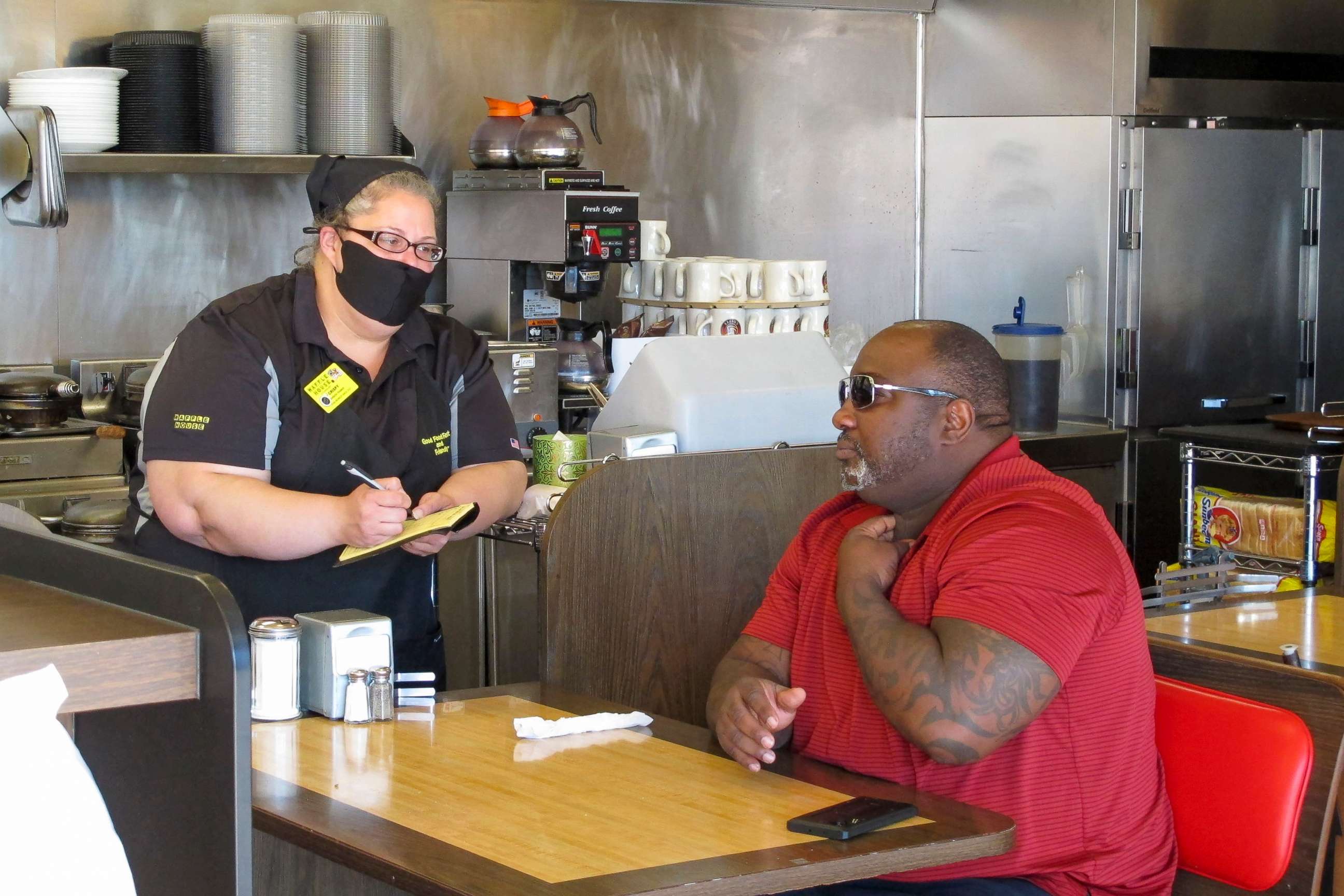
"Savannah is experiencing thousands of visitors on our streets, in our establishments and most of them are not wearing face coverings," Johnson said in a letter Tuesday to Gov. Brian Kemp.
In Chatham County, which includes the city of Savannah, "infection numbers have exploded over the last 3 weeks and there is no indication that this disturbing trend is reversing," Johnson wrote.
11:22 a.m.: More than 10K cases confirmed in Alabama in the last 2 weeks
In Alabama, more than 10,000 new cases of the coronavirus have been confirmed just in the last two weeks, state health officer Dr. Scott Harris said Tuesday.
More than 900 people have died in the state, Harris said.
About 275 intensive care unit beds remain available, he said.
Alabama's safer-at-home order was set to expire on July 3, but Gov. Kay Ivey said Tuesday she is extending the order to July 31.
The state is not "overwhelmed yet," but "we are still in the thick of this virus," Ivey warned.
She pleaded with residents to wear masks and said social distancing must apply to 4th of July celebrations.
Beaches are open in Alabama without a limit on gatherings. Theaters and bowling alleys are open, as well as restaurants, with social distancing guidelines.
11 a.m.: Florida tops 150,000 cases
Florida has now topped 150,000 cases of the coronavirus, with over 152,000 people diagnosed as of Tuesday, according to the state's Department of Health.
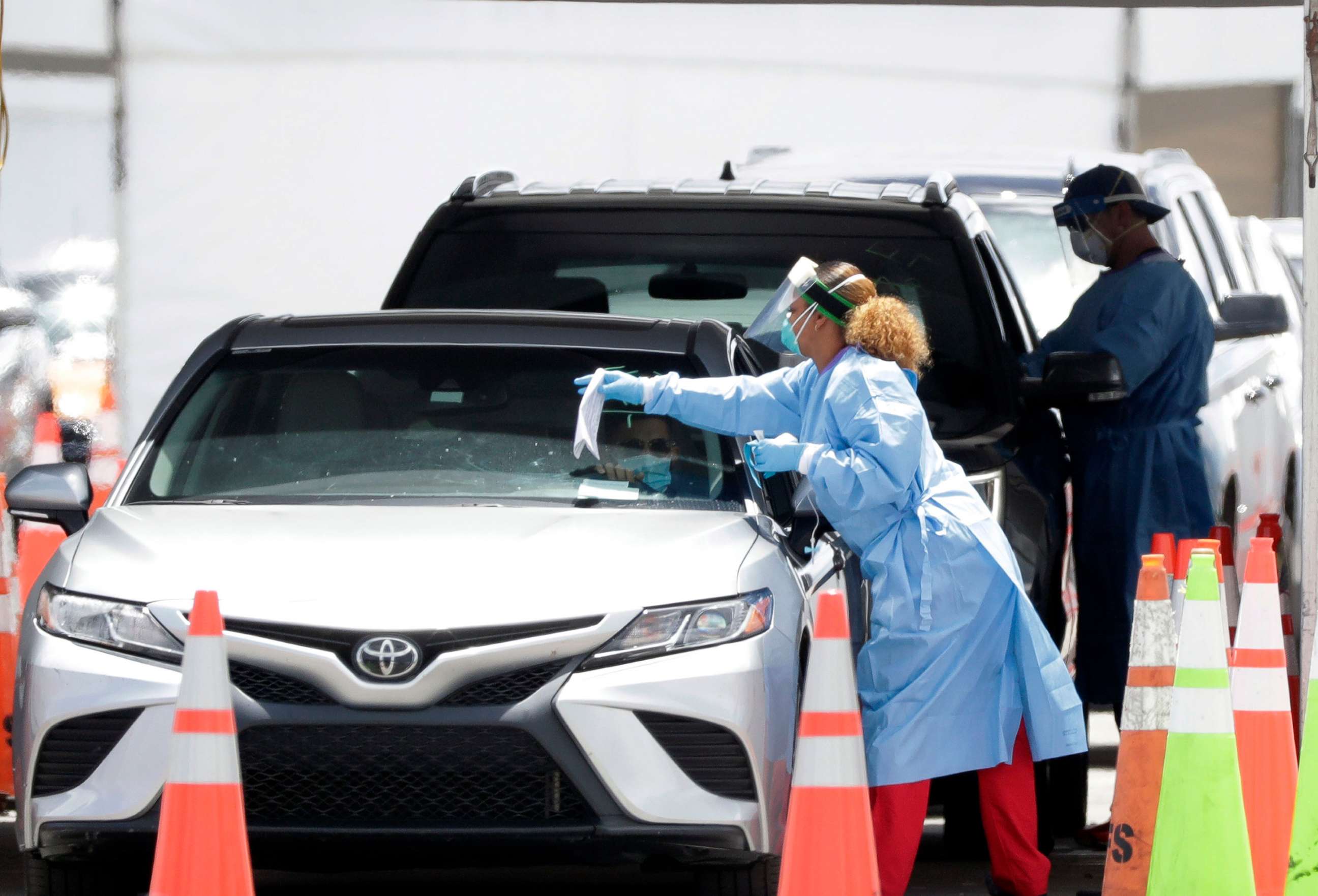
That marks an increase of 6,012 cases in one day -- and an increased positivity rate to 14%.
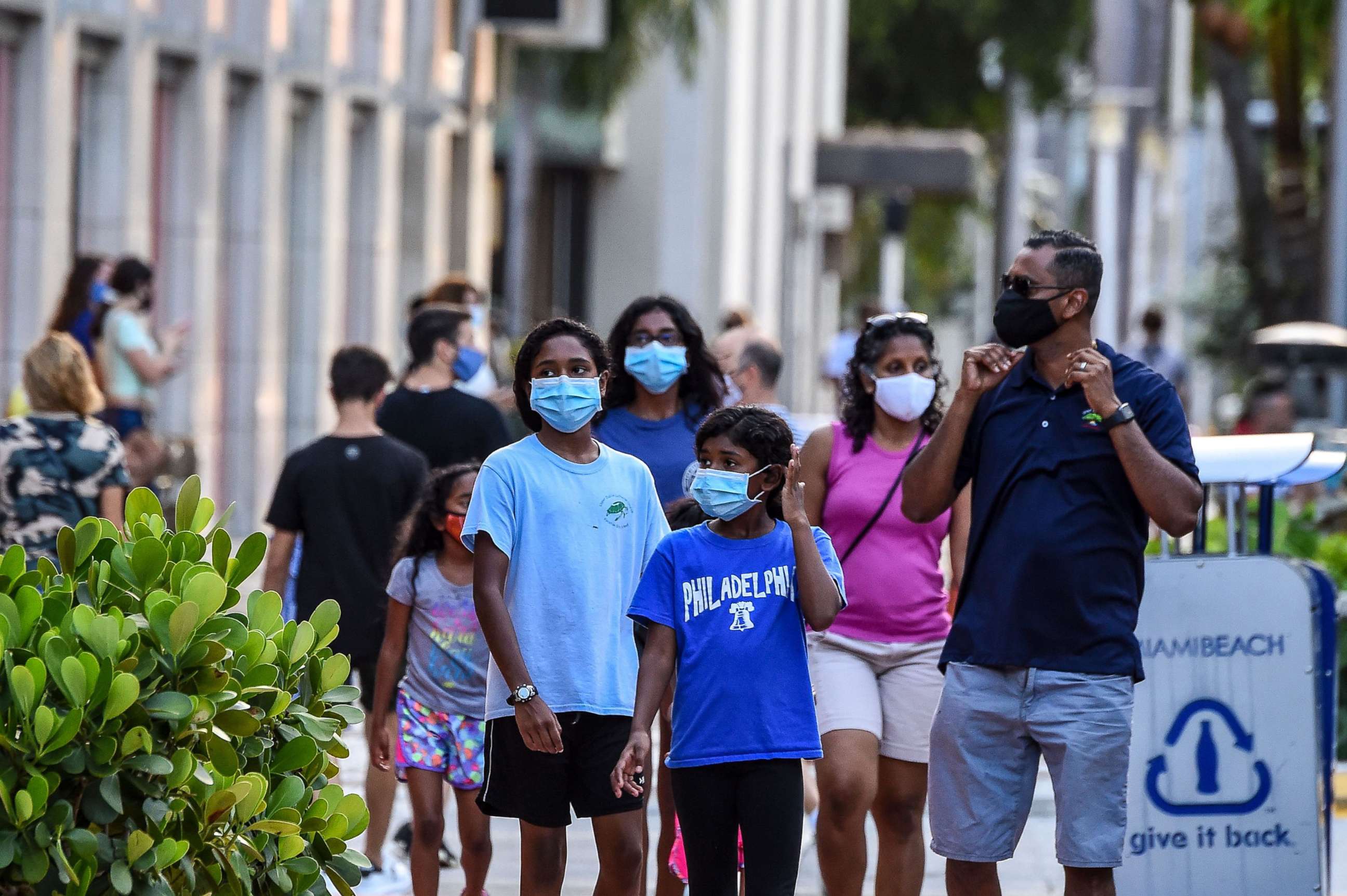
9:38 a.m.: No social distancing, optional masks at Mount Rushmore event with Trump
South Dakota won't be enforcing social distancing at the Mount Rushmore July 4th celebration with President Donald Trump, Republican Gov. Kristi Noem told Fox News Monday night.
"We told those folks that have concerns that they stay can home. But those who want to come join us, we will be giving out free face masks if they choose to wear one," Noem said in a Fox News interview with Laura Ingraham. "We won't be social distancing, we're asking them to come, be ready to celebrate the freedoms and the liberties we have in this country."
Noem added that she's told residents to focus on "personal responsibility" and that everyone should make a decision "that they're comfortable with."
The event will take place on July 3.
8:57 a.m.: Brooklyn Nets star DeAndre Jordan tests positive for COVID-19
Brooklyn Nets center DeAndre Jordan announced Monday that he has tested positive for the novel coronavirus.
Because of the diagnosis, Jordan said he won't be joining his team for the restart of the NBA season in Orlando next month.
8:06 a.m.: Over 100 cases linked to single bar in Michigan
At least 107 new cases of COVID-19 have been linked to a bar in East Lansing, Michigan, officials said.
The Ingham County Health Department is asking anyone who went to Harper's Restaurant & Brew Pub between June 12 and June 20 to quarantine themselves for 14 days since their visit and watch for symptoms.
The infected individuals are between the ages of 16 and 28, and none have been hospitalized so far. Most of the cases have had mild symptoms, with 28 people having no symptoms at all. At least 40% are Michigan State University students or recent graduates, officials said.
Just 12 of the cases are from secondary transmission, meaning people who were in contact with a primary case but did not go to the bar themselves, officials said.
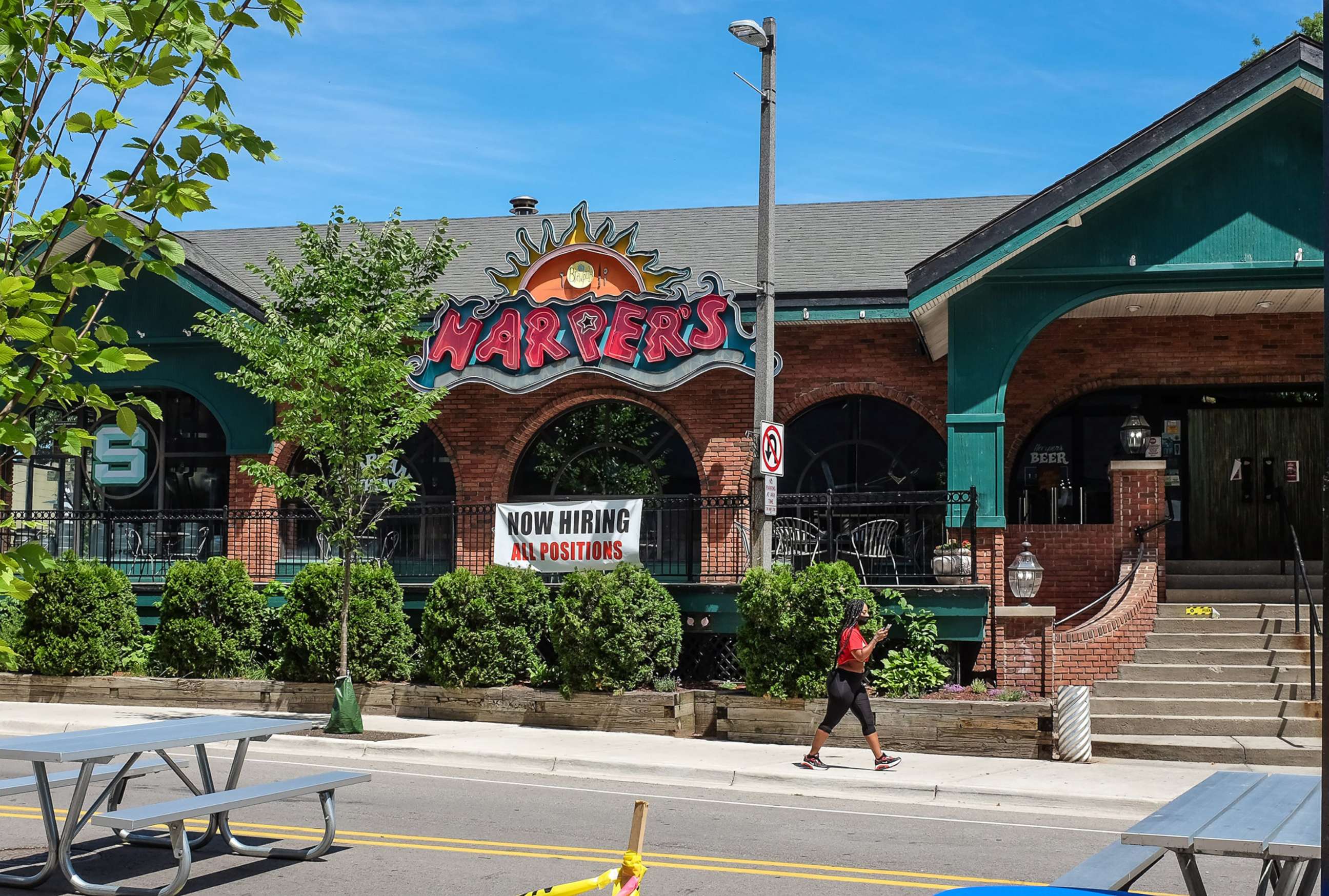
In a statement posted to Facebook last week, Harper's Restaurant & Brew Pub announced that it has decided to close temporarily to implement a program to eliminate lines and to install air purifying technology. The bar said it had reopened at 50% capacity on June 8 according to the governor's executive order.
"We have experienced long lines on the public sidewalk in front of our building," the business wrote in the June 22 post. "We have attempted to instruct customers waiting in line to wear face coverings and practice social distancing through signage on the public sidewalk and with a banner on our railing. Our oversight of the line on our stairs has been successful, but trying to get customers to follow our recommendations on the public sidewalk has been challenging."
The growing cluster of cases has prompted Ingham County officials to issue an emergency order reducing restaurant capacity to 50% or no more than 75 people, whichever is less. Restaurant capacity was already restricted to 50% of normal seating, but there was no limitation on the number of patrons.
"Large crowds are difficult to control," Ingham County health officer Linda Vail said in a statement Monday night. "By allowing no more than 75 people, restaurants and bars will be better able to enforce social distancing and the use of masks and face coverings. I strongly encourage all bars and restaurants to strictly enforce safety measures and to do all they can to help stop the spread of coronavirus in our community."
7:25 a.m.: 'The minute we opened, it was like COVID didn't exist,' Miami mayor says
Since Miami began reopening in late May, Mayor Francis Suarez said he's seen people acting as though the coronavirus pandemic never happened.
"The minute that we opened, it was like COVID didn't exist and people just forgot and, in some cases, are still forgetting," Suarez told ABC News chief anchor George Stephanopoulos in an interview Tuesday on "Good Morning America."
"You know, the city of Miami was actually the last city in the entire state of Florida to open," he added. "I got criticized at the time for taking too long, some said."
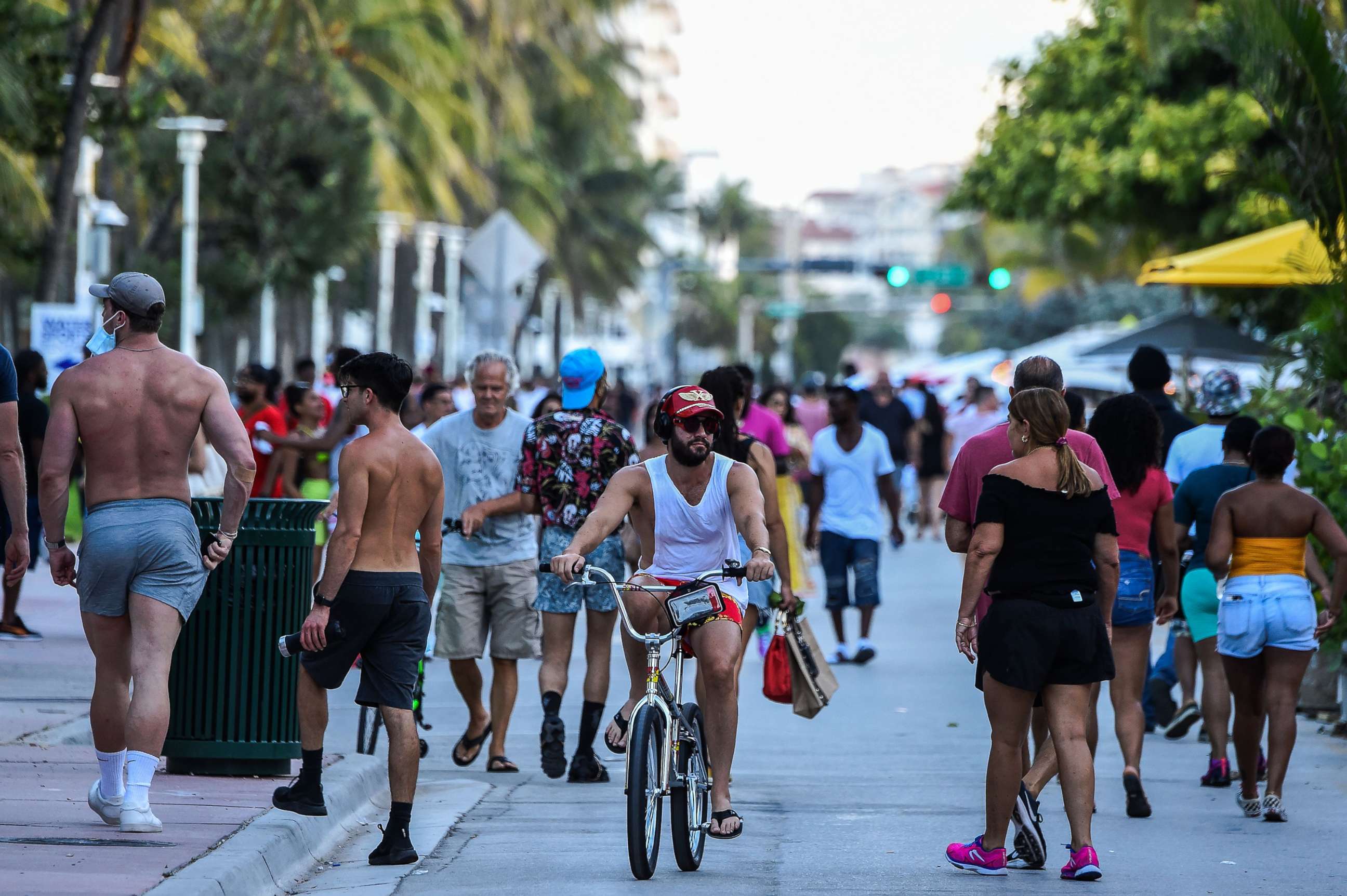
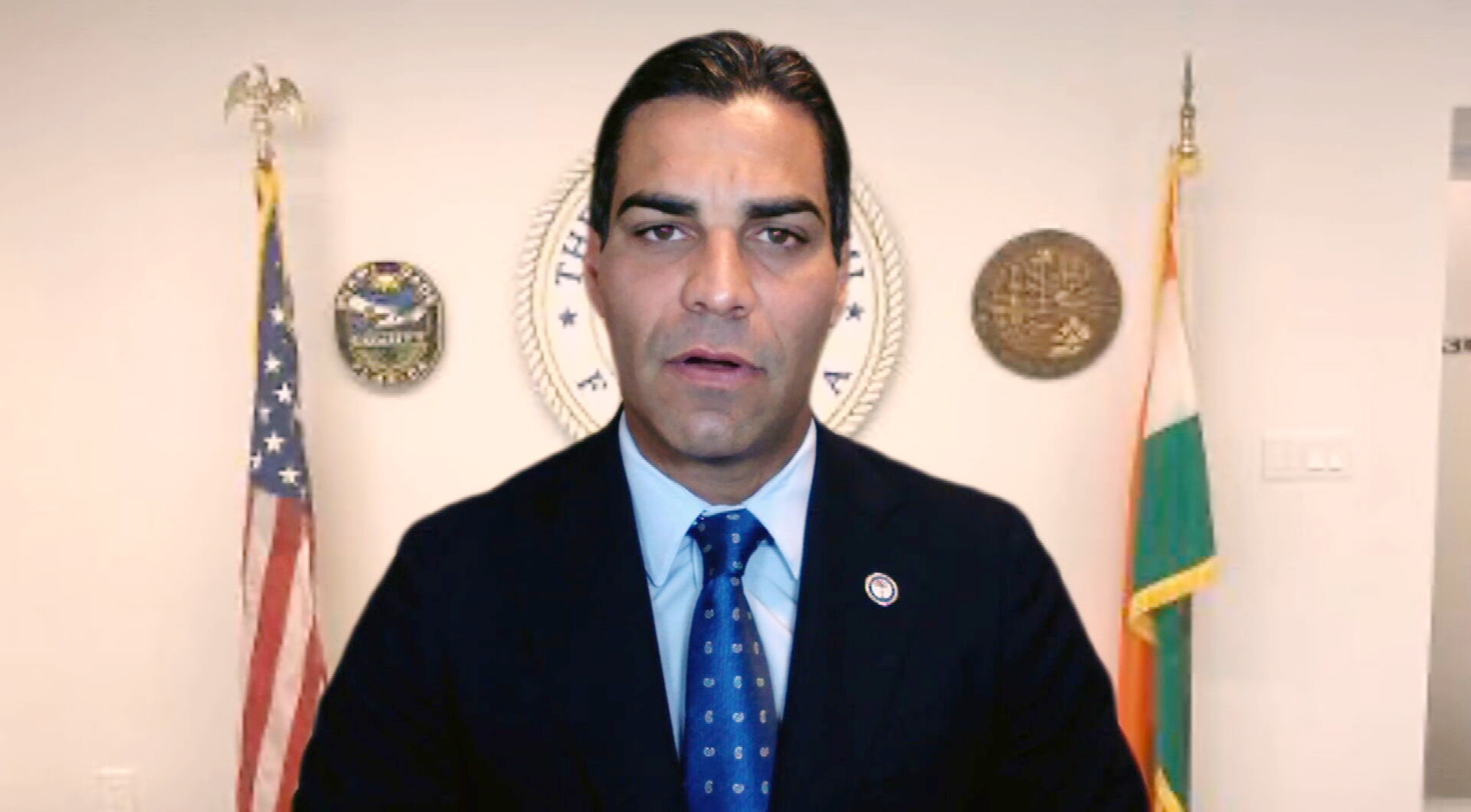
Miami is now the hardest-hit city in Florida's novel coronavirus outbreak as cases rise across the Sunshine State. The mayor said his office is doing everything they can to control the spread of the virus.
"People are congregating, they're having a good time, they're partying and they're spreading the disease incredibly efficiently, and it's starting to stress our hospital system," Suarez said.
Miami and a handful of other cities in Miami-Dade County have now made it mandatory for people to wear face masks in public at all times, which Suarez called "a no-brainer." Miami has also implemented fines for those who don't follow the rule. Meanwhile, businesses that are found not following coronavirus protocols will be shut down for 10 days on the first occurrence, 15 days on the second occurrence and 30 days on the third occurrence.
"They're upset that we're implementing some of these rules, but we're trying to do that in a surgical way so that we don't have to undo some of the openings that we've done," Suarez said. "We're doing it also so that we don't have to re-implement a stay-at-home order, which was extremely effective in March and early April but it also crippled our economy."
What to know about coronavirus:
- How it started and how to protect yourself: Coronavirus explained
- What to do if you have symptoms: Coronavirus symptoms
- Tracking the spread in the U.S. and worldwide: Coronavirus map
6:28 a.m.: Arizona hospitals are on the brink
Hospitals in Arizona are reaching capacity amid a surge in coronavirus cases, according to an internal memo from the Federal Emergency Management Agency.
The memo, obtained by ABC News, states that both Flagstaff Medical Center and Little Colorado Medical Center have had zero "medical-surge availability" since June 24. Patients are being directed to hospitals in Yavapai and Maricopa counties, according to the memo.
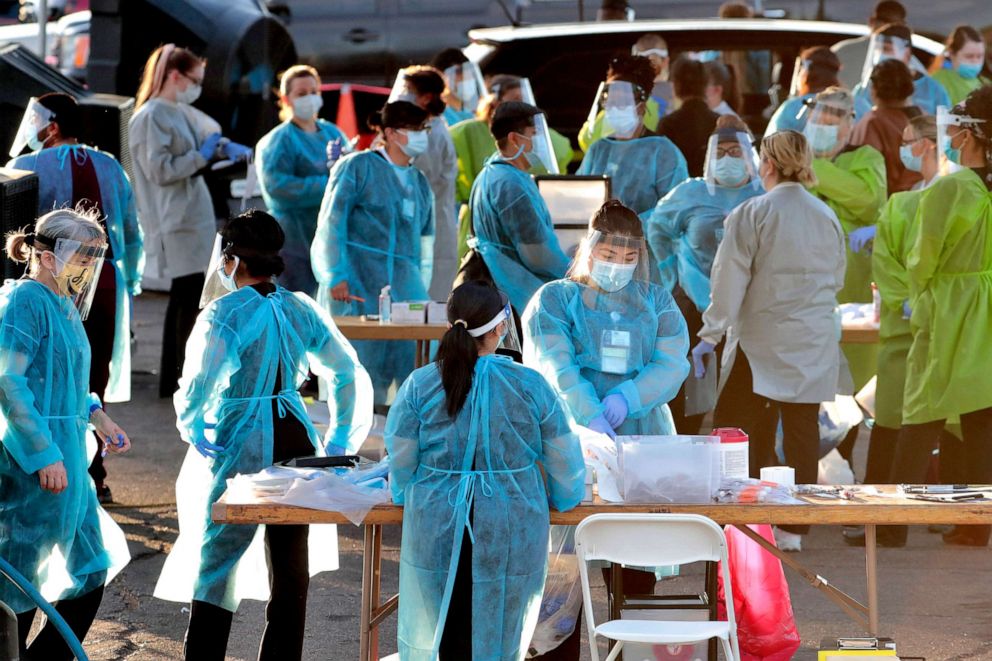
Coronavirus-related hospitalizations across Arizona have nearly doubled in the past two weeks, while intensive care units are at 88% capacity.
The number of COVID-19 cases in Arizona has jumped from 13,000 on May 15 to 74,500 on Monday, while the statewide death toll has nearly doubled in the last six weeks. More than 1,500 people in the Grand Canyon State have died from COVID-19.
5:24 a.m.: Australia to reimpose lockdown on Melbourne suburbs
Australian officials will reimpose lockdown restrictions on a number of suburbs around Melbourne, as the country's second-largest city grapples with a spike in coronavirus infections.
Beginning at 11:59 p.m. local time on Wednesday, a stay-at-home order will take effect in 10 postal codes in the Melbourne area that have been identified as community transmission hot spots for the novel coronavirus. The lockdown will remain in place at least until July 29, according to a statement Tuesday from Daniel Andrews, premier of the southeastern Australian state of Victoria.
"I know this will be terribly disruptive and difficult but if everyone sticks to the rules and we see transmission come down, then in four weeks the restrictions can lift," Andrews said.
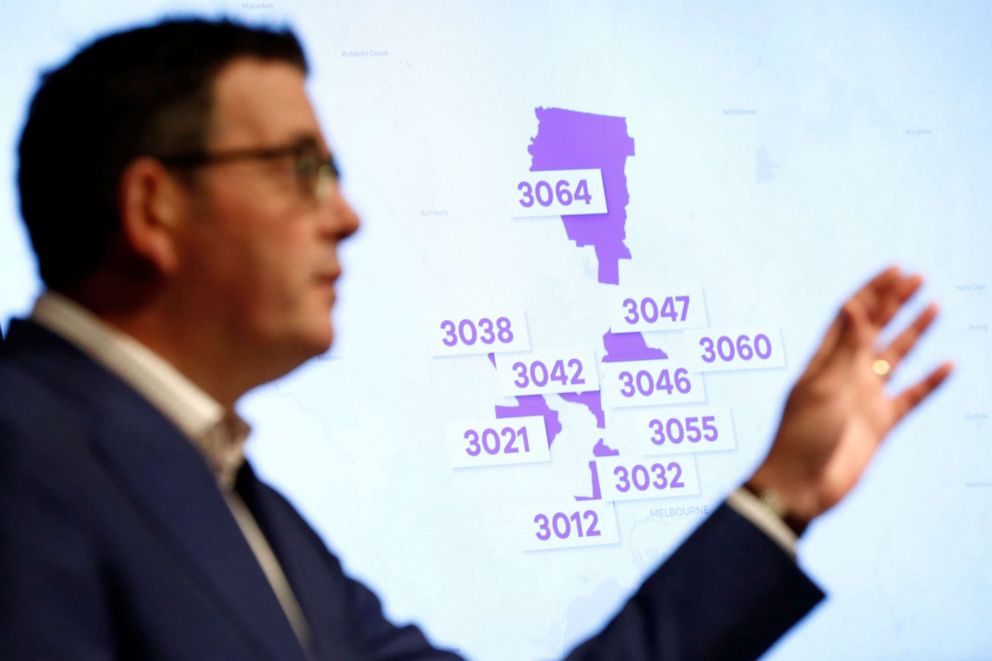
Residents of the affected postal codes will only be allowed to leave their homes to shop for food and supplies, to seek and provide care, to exercise, and to study or go to work -- if they can't do so from home. Businesses and facilities in those areas that have recently reopened, including beauty salons, gyms, libraries and swimming pools, will once again be restricted. Cafes and restaurants will again only be open for take-away and delivery service, Andrews said.
"Very clearly, this is not where we wanted to be," he added. "I understand people are tired. We're all frustrated. We all just want things to go back to how they once were. And the sooner we all do the right thing, the sooner we can beat this."
Just under 8,000 people in Australia have been diagnosed with COVID-19 and at least 104 of them have died, according to a count kept by Johns Hopkins University.
4:42 a.m.: WHO to send team to China to investigate COVID-19 origin
The World Health Organization is sending a team to China to investigate the origins of the novel coronavirus.
"We can fight the virus better when we know everything about the virus, including how it started," WHO director-general Tedros Adhanom Ghebreyesus said during Monday's press briefing in Geneva.
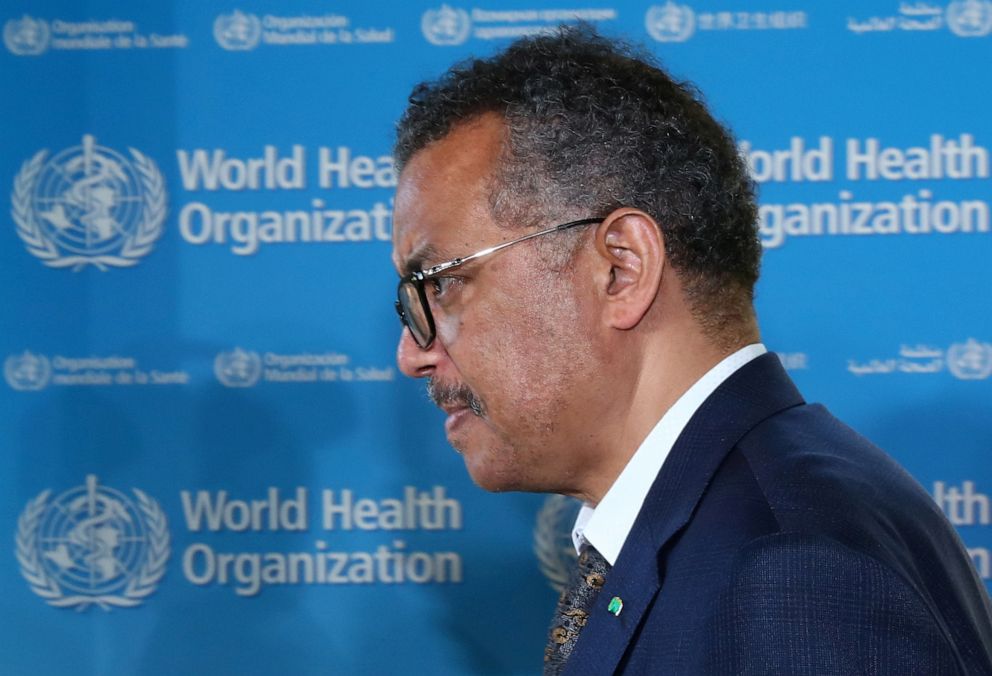
The very first cases of COVID-19 were identified in the Chinese city of Wuhan last December, months before the rapidly spreading outbreak was declared a pandemic.
Tedros said the investigative team will travel there next week.
"We hope that will lead into understanding how the virus started and what we can do for the future to prepare," he added.
3:32 a.m.: US reports more than 41,500 new cases
More than 41,500 new cases of COVID-19 were identified in the United States on Monday, according to a count kept by Johns Hopkins University.
The latest daily caseload is up from the previous day, but still lower than the country's record high of more than 45,000 new cases identified last Friday.
The national total currently stands at 2,590,582 diagnosed cases with at least 126,141 deaths.
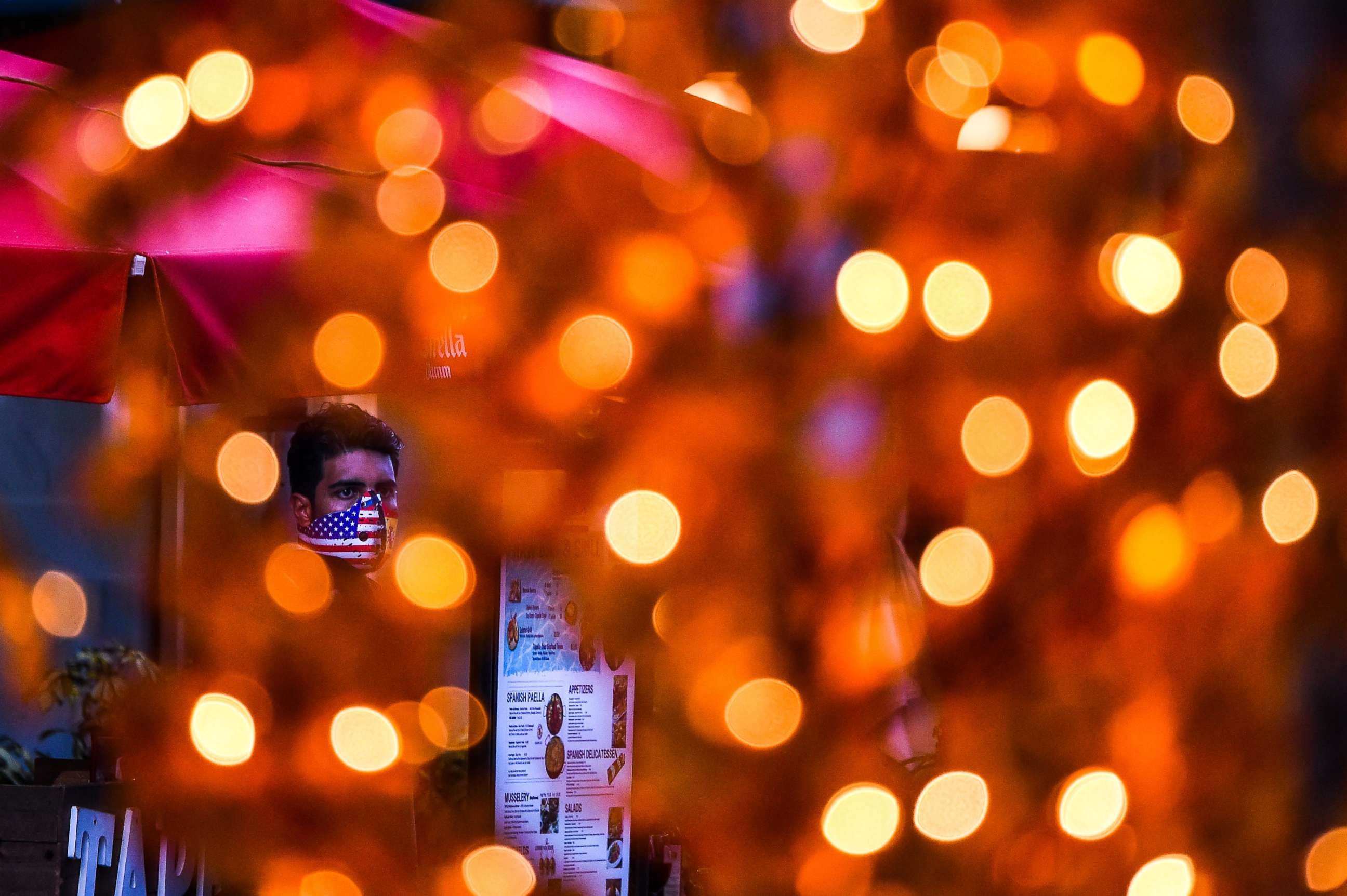
The cases include people from all 50 U.S. states, Washington, D.C., and other U.S. territories as well as repatriated citizens.
By May 20, all states had begun lifting stay-at-home orders and other restrictions put in place to curb the spread of the novel coronavirus. The day-to-day increase in cases then hovered around 20,000 for a couple of weeks before shooting back up to over 30,000 and then crossing 40,000 last week.
Nearly half of all 50 states have seen a rise in infections in recent weeks, with some -- such as Florida, South Carolina and Georgia -- reporting daily records.
ABC News' Jeff Cook, Anne Flaherty, Brian Hartman, Josh Margolin, Arielle Mitropoulos, Allison Pecorin, Ben Siegel, Ben Stein and Scott Withers contributed to this report.
